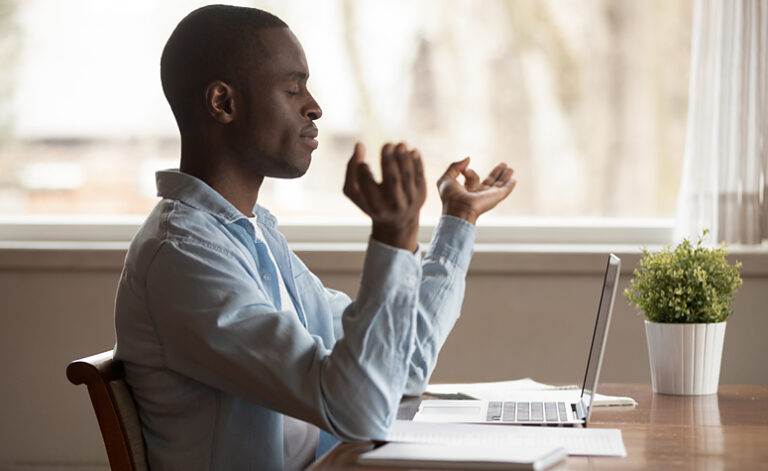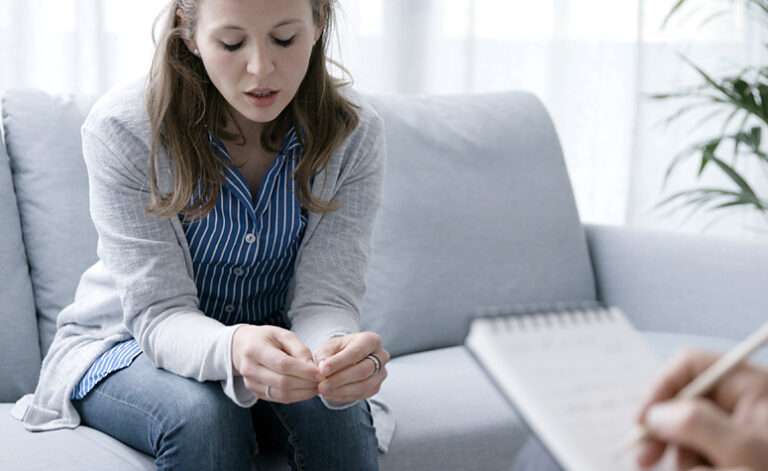9 Ways to Quickly Reduce Anxious Feelings
Anxiety refers to a set of symptoms and feelings everyone goes through once in a while. When we feel tense, nervous, and apprehensive, our body is actually responding to what it perceives as a threat, which can be anything from arguing with a loved one to worrying about a job interview.
As anxiety increases, calming ourselves down can be almost impossible, and we begin to lose control of our emotions. However, there are techniques that you can learn, practice, and use instantly that will give you in-the-moment relief from anxiety, allowing you to remain calm in stressful situations.

How can I quickly calm my anxiety?
Try the following quick and easy techniques the moment you begin feeling anxiety building up inside you to help calm the situation.
1. Accept your anxiety
Counterintuitive as it may seem, accepting that you feel anxious and allowing it to take its natural course can sometimes be the best way to deal with it. Experiencing anxiety is normal and natural; by acknowledging and embracing it, we can overcome it faster than trying to going against it.
In addition, if you try to resist your feelings of anxiety and stress, you might develop a persistent fear of these feelings coming up, and this often leads to a more severe panic attack. Learning to acknowledge and embrace our true feelings can be a positive first step in dealing with our problem with anxiety.
2. Avoid stimulants like coffee and alcohol
Caffeine and alcohol can often give you an effect opposite to what you might expect. Coffee, for instance, has been proven to heighten anxiety, particularly when taken in large doses. The same is true with alcohol, which initially helps calm us down when we feel anxious. However, alcohol doesn’t pair well with anxiety and, over time, can significantly worsen your symptoms.
3. Adopt some relaxation techniques
Anxiety causes you to breathe rapidly and your muscles to tighten, increasing your heart rate and resulting in light-headedness, nausea, sweating, and other uncomfortable physical symptoms of anxiety.
Relaxation exercises, such as focused breathing, allow you to identify and release tension from specific parts of your body, helping to reduce anxiety.
A simple relaxing breathing exercise programme
Here is a basic breathing exercise programme that anyone can do in the moment to alleviate the symptoms of anxiety:

- Take in a slow, deep breath through your nose for four seconds …
Imagine your lungs filling up with air, starting from the bottom and going up, making them as full of air as possible. You should feel your stomach rising as you do this - Hold your breath for three seconds
- Exhale gently through your mouth for a count of six, concentrating on relaxing any tense muscles as you do
- Introduce muscle relaxation while doing the above step by gradually working up through your body, tensing each part for five seconds, and
then slowly releasing - You’ll feel the tension go away as you do this simple exercise
Breathing in slightly raises your heart rate, while breathing out lowers it slightly. So, by exhaling slightly longer than you inhale, you help lower your heart rate.
4. Distract yourself
Whenever you start having anxious thoughts, you can distract yourself by doing something that requires your full attention.
Something as simple as leaving the room or stepping outside can be effective. Another technique some people use to calm themselves down is counting backwards.
For this technique, find a quiet place, close your eyes, and count backwards until your anxiety subsides. If this doesn’t work, try something more challenging, like counting down from 100 in threes. Many people find that staying focused on subtracting numbers prevents them from continuing to worry.
You can use this technique to calm your anxiety when you’re on the go, such as when shopping, working, or riding the train.
Changing focus can be beneficial when anxiety hits you at night. Letting your mind dwell on whatever is making you worry will only prolong your anxiety. Get up and distract yourself. Here are additional tips on how to stop ruminating.
5. Visualise peacefulness
Another way to calm yourself down and prevent anxiety from getting out of control is through visualisation, which combines aspects of mindfulness and breathing techniques. An example of this is the 5,4,3,2,1 technique. Simply close your eyes, take a few deep breaths and:
This grounding technique (featured step-by-step on our Instagram) will help you focus on your senses, release you from distractions, and direct your attention back to the present. Following all these steps will help calm your anxiety.
- Name 5 things that you see
Examples are massive things like buildings, trees or houses, as well as small objects like pens or a pair of glasses.
- Name 4 things that you feel
Identify four things that are touching your skin or your body is experiencing, such as your socks against the skin of your feet, the feeling of your denim jeans or the arm of the chair you’re sitting on.
- Name 3 things you can hear
Focus on the ambient or background sounds you may not usually notice, such as birds chirping, children playing outside, or the sound of wind through the trees.
- Name 2 things that you can smell
Initially, this may seem difficult, so you might have to go to places where things with a scent can be found, such as the bathroom, the garden, or the laundry area.
- Name 1 thing that you can taste
You can take a sip of a beverage and focus on the flavour; this can also include the after-taste of a drink, meal or chewing gum.
This grounding technique will help you focus on your core senses, release you from distractions, and direct your attention back to the present. Following all these steps will help to calm your anxiety.

What lies behind us and what lies before us are
tiny matters compared to what lies within us
6. ‘Burn off’ your anxiety
When you’re experiencing anxiety, your adrenaline level may make it hard for you to concentrate on performing a technique like deep breathing.
In such moments, try doing something that will make your body get rid of this adrenaline. Some of these activities include:
- Chores that require a lot of energy to complete
- High-intensity exercise
- Dancing around the house to loud music
- Any aerobic activity or exercise
- Going outside and getting some fresh air
It’s important to “release” your anxiety, and these activities can calm both your brain and body, allowing you to focus and think rationally. If engaging in physical activity is not helping, you can try writing about it. An anxiety journal can help remove negative thoughts from your mind, and you can also use it to think clearly about how you’re going to remain calm after you’re done writing your journal entry.
7. Question and challenge your thoughts
When we focus on unhealthy and irrational thoughts instead of healthy and rational ones, the end result is anxiety.
Pausing and moving past destructive thoughts before they consume our minds is a helpful technique to calm anxiety. It may take a while to learn and master this strategy, but it’s well worth the effort.
When an unhealthy thought enters into your mind, simply pause for a few seconds and seriously think about the following:
- How will this thought make me feel?
- Is it a fact or just an opinion?
- Is it a rational or irrational thought?
- What are other outcomes to consider?
Initially, being able to perform this technique automatically may be challenging. Try journaling in the evenings. Write down any unhealthy thoughts you had during the day that triggered anxiety. Reflect on these thoughts and answer the questions above. With practice, you will gain the ability to pause and dismiss negative thoughts as they arise.
8. Share your feelings
A popular quote goes, “A problem shared is a problem halved.” You might be surprised at how helpful sharing your thoughts and feelings with people can be. They may be able to give you some valuable insights.
It can be scary to open up to someone who isn’t a family member or friend, such as someone at work. Be thoughtful and discreet when talking to your boss about your mental health, and remember that by courageously speaking up, you’re potentially helping other people in your workplace.
9. Listen to some music
Science has demonstrated that music is an effective means to calm oneself down. A study published in the journal Psychoneuroendocrinology proved that “music can be considered a means of stress reduction in daily life, especially if it is listened to for the reason of relaxation”.
If it’s possible to take a break from whatever is triggering your anxiety, play some classical or slow and soft pop music – whatever works for you. This strategy can be especially helpful with workplace anxiety because you can return to your desk and destress with a few minutes of calm music.

Seeking Treatment for Anxiety
If your anxiety symptoms are not showing any signs of improvement, or may even be getting worse despite your best efforts and using the techniques outlined above; and if your struggle with anxiety is causing damage to your quality of life, you may need professional support in managing your symptoms.
FREE Anxiety Assessment
If you or a loved one are struggling with anxiety, there is hope and a solution for you. You can receive treatment as an outpatient or inpatient and through one-on-one or support group therapy. We understand the challenges you’re facing and we’re here to offer compassionate help and support.
Our multidisciplinary team of experts have successfully treated thousands of people suffering from anxiety, helping them regain control of their lives.
We can present and explain the world-class treatment options we offer, discuss your problem with anxiety with you, assess your condition, and give you recommendations on the best and most appropriate next step you can take so you can regain control of your life.
Our highly trained advisers are available to speak to you right away, simply call 0808 252 3379 today.
We can discuss your concerns in complete confidence, explore the options for treatment, and help you to understand what will work best for you.
We’ll also help you to book your free anxiety assessment there and then, with appointments usually available within only a few days.
We understand that taking the first step can be the most difficult, but we’re here to offer support – with no pressure or judgement.
Professional and compassionate help is just a phone call or click away.




